September Forum cases
The cases presented at the COPE September 2015 Forum, along with the advice given and updates on previous cases, are now on the COPE website to view.
New cases
15-10 Handling self-admissions of fraud
15-11 Inability to contact an author to obtain permission to publish
15-12 Author impersonating corresponding author without knowledge of coauthors
15-13 Suspected image manipulation involving four journals
15-14 Duplicate publication and removal of article
Updates
15-05 Reviewer requests to be added as an author after publication
15-06 Authorship dispute
15-07 Ethics committee approval
15-08 Author disagreement regarding article corrections
15-09 Revoked parental consent
Forum discussion topic: Who “owns” peer reviews?
The Forum discussion topic on 9 September was "Who “owns” peer reviews?" which discussed the two new trends which have recently come together within scholarly publication: open review, and the desire to give credit to reviewers. A summary of the discussion at the COPE Forum and of the comments on the COPE blog can be found on the COPE website. COPE will convene a group to draft an initial discussion document on this issue.
COPE-WAME workshop, New Delhi, India: Detecting and responding to research (and publication) misconduct
COPE, in collaboration with the World Association of Medical Editors (WAME), conducted a full day pre-conference workshop ahead of WAME's 20th anniversary meeting on 1 October 2015 at All India Institute of Medical Sciences, New Delhi, India. Former COPE Vice-chair Charlotte Haug and council member Muhammad Irfan represented COPE in the workshop. More than 30 people participated, the majority of whom were medical editors from India and neighboring countries (Pakistan, Nepal and Bangladesh).
Christine Laine, Editor-in-Chief of Annals of Internal Medicine, her deputy editor Darren Taichmann, and WAME President Lorraine Ferris helped run the workshop.
The workshop started with three introductory talks on publication ethics and misconduct (Charlotte Haug), conflicts of interest (Christine Laine) and authorship issues (Darren Taichmann), followed by a very lively plenary discussion.
Charlotte Haug then introduced the COPE Code of Conduct for editors and publisher, and Muhammad Irfan went through COPE's resources for editors (flowcharts, guidelines, eLearning, Forum meetings, etc).
After a break, participants worked in groups of two or three on the COPE eLearning modules. As a special feature for this workshop, COPE created a unique log-in so that participants could access the members only eLearning modules. This was very well received, and about a third of participants asked for certificates as proof that they had completed one or more modules.
The workshop ended with a 90 minute breakout session discussing COPE cases. As always, this created a lot of discussion, both of the cases and the relevant experiences of the participants.
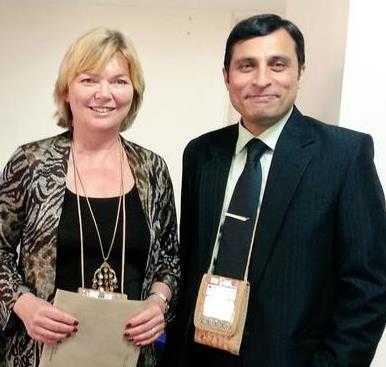
Former COPE Vice-chair Charlotte Haug and COPE council member Muhammad Irfan at the COPE-WAME workshop
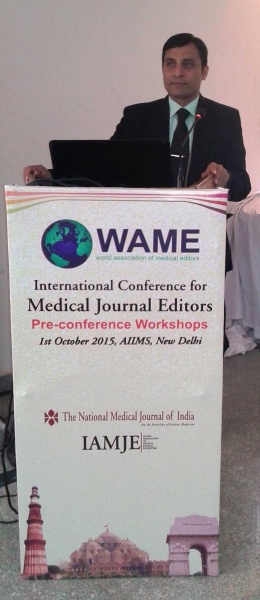
COPE council member Muhammad Irfan speaking at the COPE-WAME workshop
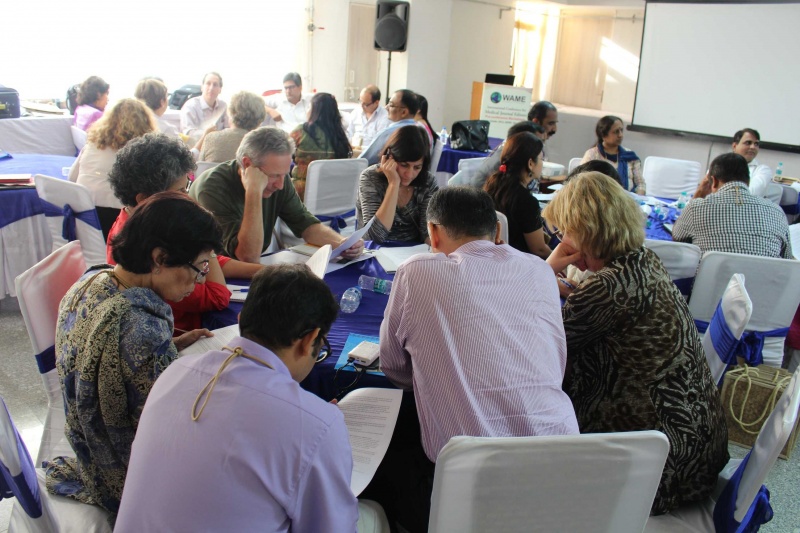
Workshop session at the COPE-WAME workshop
COPE Seminar: An Introduction to Publication Ethics
The COPE Seminar "An introduction to publication ethics" was attended by nearly 50 people on Monday 12 October 2015 at the Park Inn Hotel, London Heathrow. The seminar was in collaboration with ISMTE (International Society of Managing and Technical Editors) and was aimed at new or less experienced editors and editorial and publishing staff, who wanted to learn more about COPE and publication ethics. The seminar focused on the themes of plagiarism and peer review, with two invited speakers, Adrian Slater and Irene Hames, covering these topics. In addition, there were breakout sessions in the afternoon with cases workshops.
The presentations from the speakers can be downloaded from the COPE website: http://publicationethics.org/resources/seminars
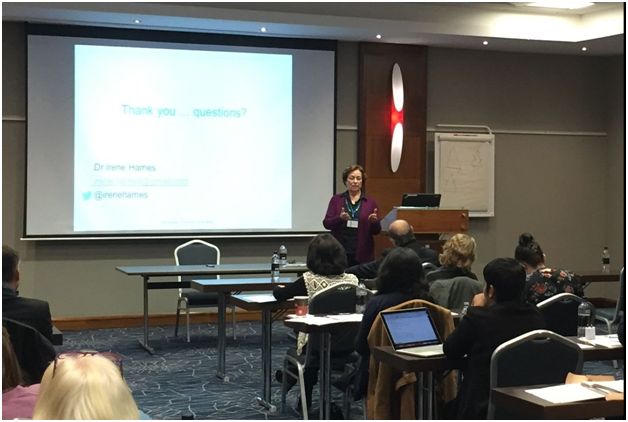
Irene Hames speaking at the COPE Seminar.
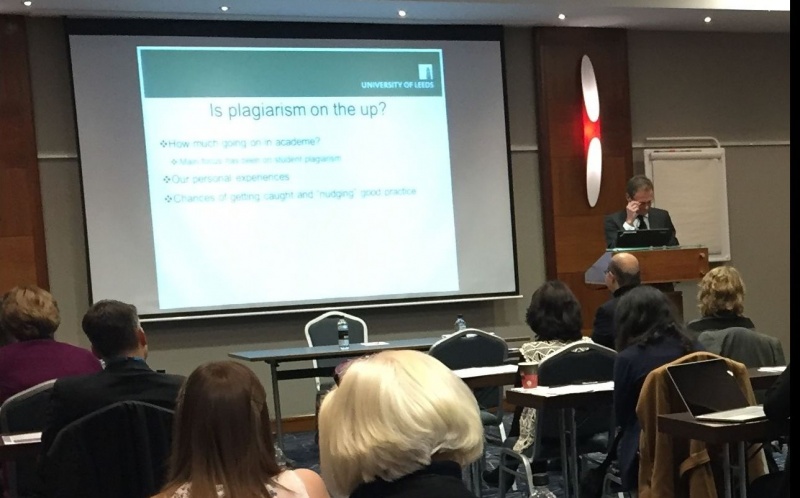
Plagiarism talk by Adrian Slater at the COPE Seminar.
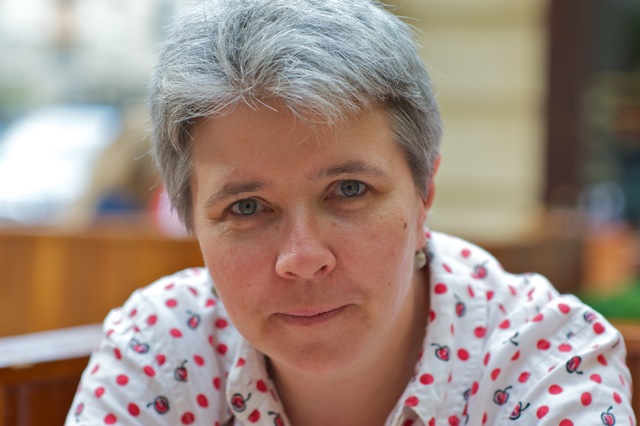 Peer review has been in the minds of many editors lately and was the subject of a lively debate at our recent London forum. Publishing is changing rapidly and the “traditional” ways of blinded pre publication review are now just one type of peer review, which includes open peer review as well as peer review post publication. One of the innovations in peer review is aimed at enabling reviewers to get credit for peer review – two such organisations trying this are Publons and Academic Karma. Among post publication peer review, one of the most hotly debated topics is whether it should be signed or unsigned and what degree of moderation is needed. Sites such as PubPeer are generally unsigned, whereas PubMed Commons reviews are signed and moderated.
Peer review has been in the minds of many editors lately and was the subject of a lively debate at our recent London forum. Publishing is changing rapidly and the “traditional” ways of blinded pre publication review are now just one type of peer review, which includes open peer review as well as peer review post publication. One of the innovations in peer review is aimed at enabling reviewers to get credit for peer review – two such organisations trying this are Publons and Academic Karma. Among post publication peer review, one of the most hotly debated topics is whether it should be signed or unsigned and what degree of moderation is needed. Sites such as PubPeer are generally unsigned, whereas PubMed Commons reviews are signed and moderated.
 Cambridge academic jailed for stealing £238K
Cambridge academic jailed for stealing £238K Harvard Medical School puts strict ethics rules under the microscope
Harvard Medical School puts strict ethics rules under the microscope Think, check, submit
Think, check, submit Advice on predatory journals and publishers
Advice on predatory journals and publishers Journal editors needed for research on core competencies
Journal editors needed for research on core competencies



